Kochland: The Secret History of Koch Industries and Corporate Power in America
Air Date: Week of February 21, 2020
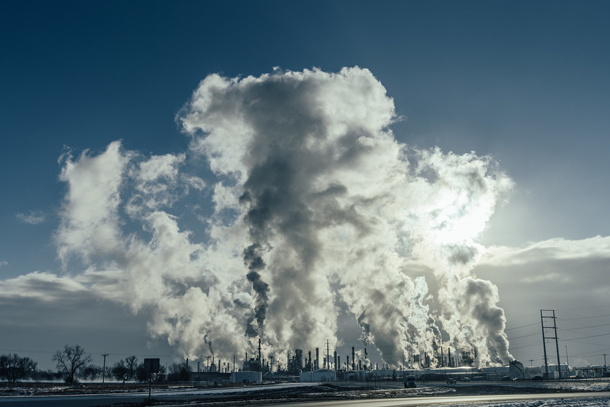
In 1998, Koch Industries was fined $6.9 million for illegally releasing heavily polluted wastewater from its Pine Bend oil refinery in Minnesota. (Photo: Tony Webster, Flickr CC BY 2.0)
Much of the anti-climate policy efforts in the U.S. can be traced back to one powerful man, Charles Koch, who sits at the helm of a fossil fuel-based corporate empire. Christopher Leonard, author of “Kochland,” spoke with Host Steve Curwood about how Charles Koch and his massive company have profited from secrecy and worked to thwart climate policy and stamp out the moderate wing of the Republican Party.
Transcript
CURWOOD: It’s Living on Earth, I’m Steve Curwood.
For decades now, climate policy has been stymied in the United States by a well-funded campaign of denial that includes elected officials dependent on campaign contributions from fossil fuel interests. And much of these anti-climate regulation interests can be traced back to one powerful man, Charles Koch. Charles Koch built the company he inherited from his father Fred into a financial powerhouse based on oil and gas all the way from the well to the pump. Koch Industries earned Charles and his late brother David massive fortunes of as much as one hundred billion dollars. The new book “Kochland: The Secret History of Koch Industries and Corporate Power in America” chronicles the rise of this behemoth and shows how it has shaped American society. Author Christopher Leonard joined us to discuss his book at a “Good Reads on Earth” event in Boston.
CURWOOD: Let's see. Can you walk us through how Charles Koch built this empire, and particularly the central role of the oil and gas industry in all of this? And you start at the beginning by mentioning that when the private equity boys came by to talk to him about expanding his daddy's company, he said nyet. Why did Charles Koch not want to get involved with other investors, private equity, the stock market, but he just had to have this all to himself.
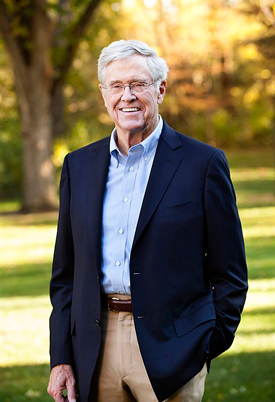
Charles Koch inherited the Koch company in 1967 at the age of 32, and over decades has massively grown Koch Industries into the second largest privately-held company in the U.S. (Photo: Gavin Peters, Wikimedia Commons CC BY-SA 3.0)
LEONARD: So first of all, let's look at what this organization is today.
CURWOOD: Okay.
LEONARD: Koch Industries is one of the largest private companies in the United States. Their annual sales are larger than that of Facebook, Goldman Sachs and US Steel combined. And this is a company that specializes in the sort of businesses that underpin civilization. They refine the fuel people use to drive to work. They make the synthetic carpet fibers in this carpet. They make the wall paneling and the building materials; they make the glass windows of this wall; they make the sensors in our cell phone. They make nitrogen fertilizer, they're the third or fourth largest producer of nitrogen fertilizer in the world, which you and I don't think we buy, but that's at the literal foundation of our food system. So if you eat, Koch Industries is almost certainly making a profit off of that activity. So these businesses are extraordinarily profitable, and the company is a huge player in them. So how did this happen? Well, when Charles Koch took over the company in '67, it was this kind of motley assortment of different assets. Almost all of them in the fossil fuels business. They had a large share in an oil refinery. They had pipelines. They were the largest crude oil gathering company in the United States, meaning, they were the company that would go out to the oil well, gather the oil and take it to market. So it's critical to note they started in fossil fuels and processing fossil fuels. That determined the direction of the entire empire from there. But from the minute he took over, at the age of 32, Charles Koch was just determined to shape this company to his vision. And he had this view that, first of all, we're going to remain privately owned. Charles Koch knew that if he had outside shareholders, they would be bugging him every quarter, how much money did you make this quarter? And he did not want that interference. So you mentioned a scene where these bankers from New York came in 1981 and tried to convince him to take the company public, which would have given him a massive, roughly $56 million payday overnight, and he sent them packing because he had this vision. And I gotta tell you, the shareholders of Koch Industries, meaning two people, benefited greatly from that decision.
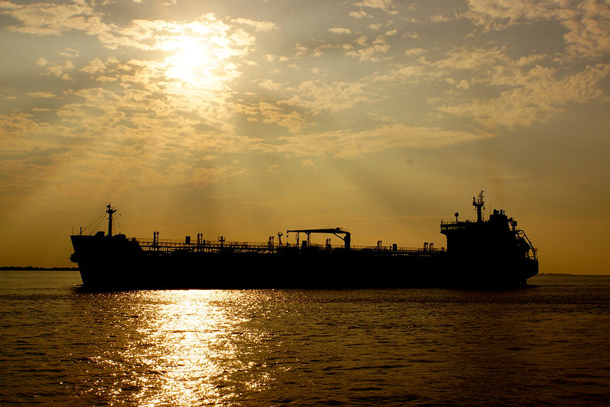
Koch Industries transports crude oil and other products around the world. (Photo: Timo Adam, Flickr CC BY-NC-ND 2.0)
CURWOOD: Tell me what you saw when you went up to see Charles Koch's office.
LEONARD: Yeah, so the company headquarters is in Wichita, Kansas on the northwest corner of town. And it's a dark limestone building with black windows, it looks like an opaque, obsidian black cube. And that's not accidental. That really reflects this firm's modus operandi, they're strategically secretive. The secret to their success is that they know more about the world than other people, and they keep what they know very close to their vest, and then they execute on what they know, to their benefit. So you can see that, that this man, Charles Koch, spends his days at the apex of this massive corporate empire, that literally spans the globe, that he's been building for 50 years. And you know, when I walked into the office after all that security and he stands up and looks at me -- and again, I wouldn't even want to know what an hour of his time is worth. It's definitely more than I get paid in a matter of years, almost certainly. And he gets up and looks at me and says, "Oh, hey, Chris, good to meet you. You didn't need to wear a tie to come talk to me." And he's got this very avuncular, kind, modest persona, that he projects. And interviewing people who've worked with him over the decades, that's exactly the person they encountered too. And it engendered a lot of loyalty in the people who worked for him, I mean, he, he doesn't pound his fist on the table. He doesn't denigrate people who work for him. He's pretty merciless. He's pretty exacting. He's pretty relentless. But he's not, you know, cruel or arbitrary. And he holds himself, I think, to the, the same exacting high standards that he holds his lieutenants to.
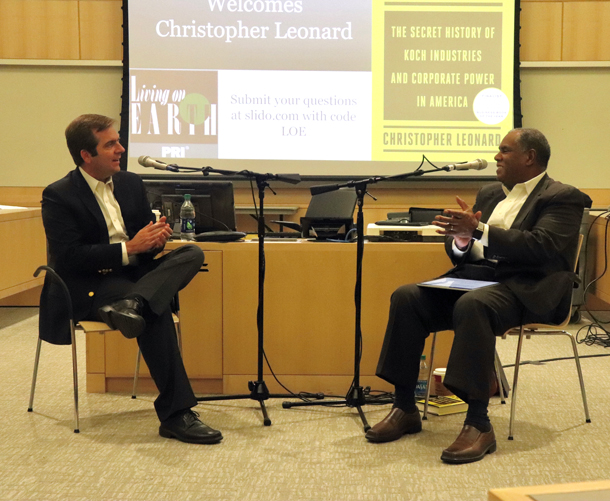
Living on Earth Host Steve Curwood (right) interviewed Kochland author Christopher Leonard at the University of Massachusetts Boston as part of the Good Reads on Earth live event series. (Photo: Jay Feinstein)
CURWOOD: Now obviously, doing gas and oil, Koch Industries were never going to be the favorite of environmental activists. But you write that early on, that Charles Koch learned his lesson about breaking environmental laws and worked hard to never do so again. Walk us through the environmental violations that happened at the Pine Bend refinery under Charles Koch's watch, and how that influenced his strategy going forward.
LEONARD: Yeah, so this was during the 1990s, and, and this is important. Charles Koch, as I said, he has this very particular vision, and he's codified it in this philosophy at the company called market-based management that has all these buzzwords, like "process owners". Well, the way people on the ground interpreted this philosophy was, profits overall. Get as much profit out of this machinery as, as you can. And you saw that kind of pathological response across the company during the 1990s. Here's what happened at Pine Bend, is you've got this massive oil refinery that is breathtakingly profitable. You and I are in the wrong line of work, we should have owned oil refineries. They make a lot of money. But a machine inside this refinery broke down, and it began to emit massive amounts of toxic ammonia. So the managers had a choice. They could divert the ammonia out into the Mississippi River as they were supposed to do, but they would have violated their permit levels and faced fines and increasing consequences from environmental regulators, escalating fines and a possible shut down. Or they could have shut the refinery down, turned it off, essentially, or at least turned off certain machines and figured out what the problem was. Well, they chose a third option, which was to dump the ammonia-polluted water out of a fire hose system out of the back of the refinery and into nearby wetlands. I mean, to the tune of hundreds of thousands of gallons a night of toxic water. And that chapter shows how an environmental engineer at the plant named Heather Faragher tried to get her bosses to stop and was sidelined, marginalized, and ignored as they continued to break the law. They were eventually caught and fined a record criminal fine by the US Department of Justice. Now, as this was happening, Koch was levied a record-breaking fine for pipeline leaks, hundreds of pipeline leaks, with the same kind of mentality behind it, that they didn't want to shut down the pipelines, they weren't reinvesting in the pipelines. They were running full-throttle, if you will, at a refinery in Texas, one of the machines was emitting carcinogenic benzene, and they didn't shut it down and a manager falsified reports to environmental regulators, another criminal case. You saw this across the company. Now, to their credit, in 1999, Charles Koch brought in all his top leadership and he said, this is going to stop. They fired virtually every division president in the company, fired them all.
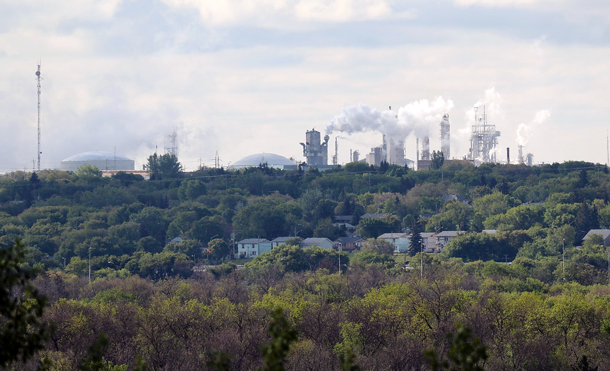
Koch Industries’ fertilizer plant in Brandon, Manitoba. (Photo: Robert Linsdell, Flickr CC BY 2.0)
They hired in new people. They restructured the company. And Charles Koch imposed this new theory called 10,000 Percent Compliance, which is that 100% of the people are going to comply with the law 100% of the time. Now, this sounds like a bunch of corporate buzzwords, but it's a real thing. I feel confident saying that. And these days you don't hear about explosions at Koch refineries, or massive pipeline spills. There are problems, I'm not trying to sugarcoat it; the book shows that, you know, at Georgia Pacific workplace injuries have been on the rise since 2012, it's not perfect. But they took complying with the law very, very seriously. And it wasn't just out of the idea that they're going to be a good Samaritan. It was this idea that, keep the regulators off our property, no more Feds, no more lawsuits. We're going to make our money by knowing more about the world than anybody else knows and executing against that knowledge, meaning, we're going to buy assets that people undervalue, we're going to own them. We're going to improve their operations and make a ton of money. And I don't want criminal cases, this is Charles Koch thinking, he did not want criminal cases interrupting that strategy.
CURWOOD: And of course, he had the apparatus to change the regulations. If he doesn't want cap and trade, do the lobbying in Washington to be sure that it doesn't go through. If he wants to have a less ferocious EPA, then do the lobbying to defang the EPA.
LEONARD: You're bringing up a really good point. You know, I think the most important thing that you're pointing to is this issue of carbon emissions and greenhouse gas emissions, okay? Yes, Koch complies with the law at its plants. But the law determines what markets are. And right now, it is free to emit greenhouse gases. There's no price put on it. And any costs associated with that are borne by people around the world, not by the companies that necessarily emit the greenhouse gases. And you know, I remember interviewing this top lobbyist at Koch. And I really wanted to understand how they lobby, why they're good at their job, what they care about. And I said, "What got you up in the morning? What was your front-burner issue?" And he said, carbon.

A Georgia-Pacific lumberyard in Oregon. Koch Industries acquired the pulp and paper company in 2005. (Photo: Max Rae, Flickr CC BY-NC-ND 2.0)
CURWOOD: Well, that's right. I mean, you write about in 2010, Waxman-Markey, the cap and trade bill, passes the House and just gets stalled in the Senate, in no small measure due to pressure from the Koch lobbyists. Please describe that political influence campaign and why the Koch affiliates, what they did to just kill Waxman-Markey and why was so important to them.
LEONARD: This was a really huge moment in history for, for everybody. This was the last best chance to regulate greenhouse gas emissions, and it came really close to happening. So, as background, we've got to remember, this seems like a different world, but in 2008, the Democratic candidate Barack Obama and the Republican candidate John McCain agreed climate change is a dire issue and we need to do something about it. That was a very dangerous moment for Koch. If a price was put on carbon, it could really be a death knell for Koch's fossil fuel business. Because, think about how much money Koch Industries has invested in just the physical infrastructure of processing crude oil. Koch owns two of the largest oil refineries in the United States. It owns pipeline networks that transport fuel. It is one of the largest traders in crude oil supplies and other energy supplies in world markets, meaning it's leasing super tankers of oil to go from the Persian Gulf to the Gulf of Mexico.

Koch companies produce everything from oil, to toilet paper, to carpet fibers. (Photo: Andre Roberto Doreto Santos, Flickr CC BY-NC-ND 2.0)
It is deeply invested. Now if a price is put on carbon, that is going to reduce demand for those fossil fuels. The value of all those assets I just described is going to fall. The volume of fuels that are processed are going to fall, and we're talking a price tag measured in T, trillions of dollars over a period of 40 years. So this is a do-or-die effort. And in 2009, as you mentioned, it really looked like Congress was going to create a regulatory framework called cap and trade, which was a Republican idea, a conservative idea, that would put a price on the pollution and let people trade against it, essentially. Koch moved in at the most opportune time for their interests, which is when this bill moved from the House to the Senate. And I'll just use one example of how they did it. First of all, they'd been working diligently for years, decades really, to politicize the issue, to make it seem that if you are concerned about climate change, you're a power-hungry, tyrannical liberal. And you know, one of the people in the book is a conservative Republican from South Carolina named Bob Inglis, who was as conservative as a person could be, but realized the science behind climate change is really undeniable. And Koch primaried him out of office. They raised up a competitor, they quit giving him money. They ran ads against politicians like that, and helped drive him out of office. And what they did was they made it politically untenable for Republicans to even acknowledge that climate change is real. In essence, big picture, that's what they did. They have a lot of very interesting mechanisms by which they can do that. Koch will secretly fund a study that comes out without Koch's name on it. Then they take the findings of those studies. They have them read into the record of the Congressional hearing, then they can have another think tank do political ads based on those findings, that are then targeted at vulnerable senators like Lindsey Graham in South Carolina. Those vulnerable senators are identified by Koch's massive network of lobbyists, and they can use this machine to create pressure and heat. And what they did was they drove all moderate Republicans off the field and made sure it was the Democrats trying to do this alone. And by doing that they raised the heat to such a temperature in the Senate, that the bill died a quiet and ignoble death. And that's what's so interesting to me about it. It's not like there was this big proclamation, like, this bill is dead. It just stops, and takes on water, and then disappears. And so it's sort of an easy victory, if you will.
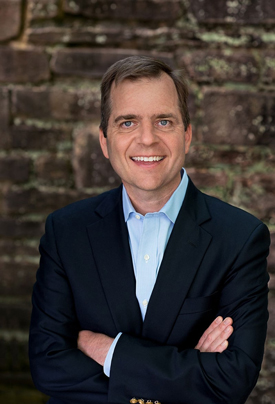
Christopher Leonard is a business reporter whose work has appeared in The Washington Post, The Wall Street Journal, Fortune, and Bloomberg Businessweek. He is the author of The Meat Racket and Kochland. (Photo: Seth Rubin)
CURWOOD: Some people listening to us have very strong feelings about Charles Koch and the Koch empire, they say, it's the evil empire, that these are horrible people, they're trying to destroy our society; pretty strong language. What did you come away from writing this book and meeting Charles Koch with, what did you come away with?
LEONARD: Well, I am in awe of what Charles Koch has built. And listen, I don't mean to cop out, I really feel like my job is to describe what happened; the value I can bring is getting inside the organization and reporting to you accurately what they did, how they think, and what's going on. So here's what I take away, just personally, it is so easy to underestimate the people inside Koch Industries. I was blown away by the level of sophistication and intelligence that exists inside of that institution. And the chapters toward the end of the book about politics are disturbing. I don't mind saying that. I mean, they burned down the moderate wing of the Republican Party, and we're all living with the consequences of that, and I won't sugarcoat it. But at the same time, you know, agree or disagree with their political goals, this really is a case study in long term strategic thinking. And our country, our politics, and our business, you know, long term strategic thinking is in desperately short supply in those fields. And this is a really great case study of a group that had a plan and stuck with it over decades. So, you know, I think it's easy to condemn and try to turn them into cartoonish villains when they're really not. You know, the people who work for Charles Koch really admire this guy, and he's a human being. Now, I think the rub is that he's a profoundly powerful human being. And when that much power is concentrated in the hands of one or a few people, you can have pretty negative side effects and consequences from it.
CURWOOD: Christopher Leonard is a business reporter and author of Kochland: The Secret History of Koch Industries and Corporate Power in America. Thank you so much for taking the time to talk with me today.
LEONARD: Thank you. I appreciate it.
Links
Kochland: The Secret History of Koch Industries and Corporate Power in America
Koch Industries’ Business Philosophy
Living on Earth wants to hear from you!
Living on Earth
62 Calef Highway, Suite 212
Lee, NH 03861
Telephone: 617-287-4121
E-mail: comments@loe.org
Newsletter [Click here]
Donate to Living on Earth!
Living on Earth is an independent media program and relies entirely on contributions from listeners and institutions supporting public service. Please donate now to preserve an independent environmental voice.
NewsletterLiving on Earth offers a weekly delivery of the show's rundown to your mailbox. Sign up for our newsletter today!
 Sailors For The Sea: Be the change you want to sea.
Sailors For The Sea: Be the change you want to sea.
 The Grantham Foundation for the Protection of the Environment: Committed to protecting and improving the health of the global environment.
The Grantham Foundation for the Protection of the Environment: Committed to protecting and improving the health of the global environment.
 Contribute to Living on Earth and receive, as our gift to you, an archival print of one of Mark Seth Lender's extraordinary wildlife photographs. Follow the link to see Mark's current collection of photographs.
Contribute to Living on Earth and receive, as our gift to you, an archival print of one of Mark Seth Lender's extraordinary wildlife photographs. Follow the link to see Mark's current collection of photographs.
 Buy a signed copy of Mark Seth Lender's book Smeagull the Seagull & support Living on Earth
Buy a signed copy of Mark Seth Lender's book Smeagull the Seagull & support Living on Earth

